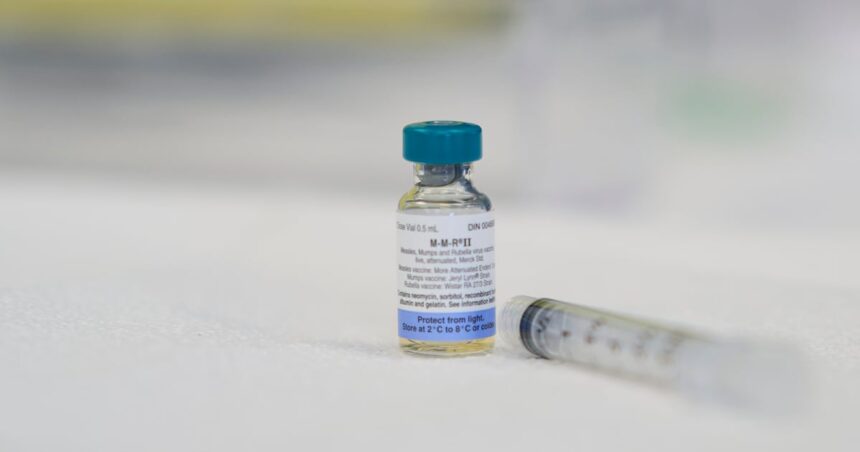The measles vaccine shortage that left a Calgary woman waiting six weeks turns out to be nothing more than a paperwork mix-up. As someone who’s covered healthcare stories in this city for over a decade, I’ve seen my share of system hiccups, but this one highlights the real consequences when administrative errors meet public health concerns.
Sarah Mitchell, a 34-year-old software developer from the Beltline neighborhood, contacted me last week after being told she’d need to wait until late April for her measles vaccine. With recent confirmed cases in Calgary and Edmonton, her anxiety was understandable.
“I called the public health clinic after reading about the outbreaks,” Mitchell told me during our interview at a local coffee shop. “They said there was a supply shortage and put me on a waiting list. I started avoiding public spaces as much as possible.”
What happened next reveals the gap between perception and reality in our healthcare system. When I contacted Alberta Health Services about Mitchell’s situation, their response came within hours.
“There is no shortage of measles vaccines in Calgary or anywhere in Alberta,” confirmed Kerry Williamson, AHS spokesperson. “This appears to be an isolated scheduling error that incorrectly cited supply issues.”
The clinic had mistakenly logged Mitchell’s request under a specialized vaccine program with limited availability rather than the standard MMR vaccine, which remains widely available across the province.
Dr. Carolyn Brown, a public health physician at the University of Calgary, explains why such mix-ups are particularly problematic during outbreak situations.
“Measles is incredibly contagious – one infected person can spread it to 12-18 unprotected individuals,” she said. “When people who want protection can’t get it due to administrative errors, we’re creating unnecessary vulnerability in the community.”
The timing couldn’t be worse. Alberta Health Services has confirmed three measles cases in the province since January, with two in Edmonton and one in Calgary. The Calgary case involved an adult who had recently traveled internationally.
City Councillor Terry Wong, whose ward includes several areas with lower vaccination rates, expressed concern when I spoke with him yesterday.
“Every barrier to vaccination, even unintentional ones like this, affects our community’s resilience,” Wong noted. “With downtown offices filling up again and events returning to full capacity, we need our public health systems operating at peak efficiency.”
For Mitchell, the resolution came quickly after AHS investigated. She received her vaccine the following day with a personal apology from clinic staff.
“I’m relieved, but I keep thinking about others who might have been turned away and didn’t pursue it further,” she said.
The incident raises questions about communication protocols within the public health system. According to AHS data from their quarterly performance reports, immunization appointment availability has actually improved since last year, with most clinics offering appointments within seven days.
When I visited the Sheldon M. Chumir Health Centre yesterday, staff confirmed they’re providing same-week appointments for measles vaccines. Pharmacist Michael Chang at a nearby Shoppers Drug Mart told me they haven’t experienced any supply issues either.
“We’ve been administering the MMR vaccine steadily all month,” Chang said. “There was a brief delay in January when one shipment arrived late, but nothing since then.”
Mitchell’s experience isn’t isolated, though. Three other Calgarians contacted me after hearing about her story, describing similar explanations about “supply issues” when trying to book vaccine appointments at different clinics.
Dr. Brown suggests a systemic review might be warranted. “Especially during outbreak situations, frontline staff need clear, consistent information about vaccine availability. If multiple people are being told incorrect information, that points to a communication breakdown.”
As Calgary’s population grows and international travel returns to pre-pandemic levels, the risk of imported measles cases increases. According to the Public Health Agency of Canada, measles cases have been rising globally, with significant outbreaks in Europe and parts of Asia.
For anyone concerned about measles protection, AHS recommends contacting your family doctor, a public health clinic, or certain pharmacies. Most Albertans born after 1970 should have received two doses of the MMR vaccine, typically given in childhood.
Mitchell hopes her experience serves as a reminder to be persistent. “If something doesn’t sound right, question it. And maybe call a different clinic for a second opinion.”
As someone who’s watched Calgary’s health system evolve through multiple restructurings and policy changes, I’d add that patient advocacy remains essential. Systems are imperfect because they’re run by humans. But in public health, those imperfections can have consequences beyond administrative inconvenience.
AHS has committed to reviewing scheduling protocols at the clinic in question and providing additional training to staff about vaccine availability information.
For now, if you’re seeking a measles vaccine in Calgary, rest assured that supplies are available. Just be prepared to ask questions if you encounter unexpected delays.







